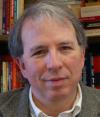Issue Date: February 8, 2008
|

-- John Roper
|
| Robert Ellsberg |
In three books, Ellsberg explores how to be holy
Robert Ellsberg has written three books about saints, All Saints:
Daily Reflections on Saints, Prophets and Witnesses for Our Time by
Crossroad, The Saints’ Guide to Happiness by Farrar, Straus and
Giroux and Doubleday, and Blessed Among All Women, also by Crossroad. In
a recent interview, Tom Fox asked Ellsberg to explain his fascination with
saints. The following are excerpts from that interview, which can be found in
its entirety at
www.NCRcafe.org.
NCR: What accounts for your interest in
saints?
Ellsberg: Partly my interest in saints has been a kind of
antidote to the tendency to identify the church too much with the hierarchy or
with the institution. When you see the church at its best, the Holy Spirit is
forming people’s lives in ways that reflect the mercy, compassion and
justice of God in the world.
All my life I have learned from the example, the witness, of people I
admired, and of course, that’s what drew me to the Catholic Worker and
Dorothy Day’s example. Dorothy had tremendous devotion to the saints and
it was connected, in part, to her deep sense that to be a Christian is to be
called to be a saint.
How did the three books on the subject come about?
As an
editor, you’re always thinking about working with other authors and
motivating them to write the kinds of books you want. It really was liberating
for someone to suggest that I should do it myself, and when I did the first
book, I realized that it just poured out of my heart. It was the kind of book
that had been stored up in me for a whole lifetime.
Are there themes in the lives of the saints you
included?
After telling the stories of the lives of all of these
different saints, I was asking myself a question: “What do they actually
have to say to the rest of us about, not just how to be a saint, but how to be
a human being? What lessons about life do they have to apply?”
I came up with what seemed like a clever title, The Saints’
Guide to Happiness, and got a book contract on the basis of that title.
Then I had to spend a couple of years thinking about, “What does that
really even mean?” Because a lot of people don’t associate saints
with happiness. I was surprised to discover that happiness was such a neglected
subject even though it’s a subject that dominates all popular culture and
every magazine you could buy. The Declaration of Independence talks about the
right to life, liberty and the pursuit of happiness. So people in this country,
if not everywhere in all times, are preoccupied with how to be happy, and not
the question of how to be holy.
Do saints try to be happy or holy?
Well, as I explored this
subject I began to see that they are really two sides of the same coin. You
have to, first of all, have a different understanding of what it means to be
holy, which is not a matter of being a prodigy or exceptional super-human or
perfect in some ways, but of holiness as really being who you were meant to be,
being your true self, expressing your humanity in the deepest sense. The
saints, by and large, are people who responded to Jesus’ call to enter
into the adventure of discipleship rather than to just stick with a code of
religious obligations, duties and the minimal sense of “here’s what
it means to be a Christian.”
What led to the third book, Blessed Among All
Women?
Although I’d done this very non-conventional collection
of saints book it was pointed out to me that in one way it was very
traditional. That is, the preponderance of saints was male. I soon thought it
was not just important to do a book on women saints that focused on them, but
that by studying examples of women saints it opened up my imagination in a lot
of ways to think about different models of holiness, particularly in female
styles of leadership in the church that are very much marginalized for a lot of
different reasons.
I used the beatitudes as themes. It was interesting to me to take all of
these stories and organize them around those themes, which admittedly is a
little arbitrary. It was, for me, a fresh and powerful way to think about these
lives and to show all these different styles of spirituality as being grounded
deeply in Jesus’ own program for discipleship.
Michael Leach, formerly editor at Crossroad, later became publisher
at Orbis. Can you talk about that relationship?
Mike was my editor at
Crossroad for All Saints, so I knew and admired him before he came to
Orbis. He made an enormous contribution to Orbis, putting us for the first time
on an even financial keel, and acquiring and editing some of our most
successful titles. Working with him was one of the happiest professional
experiences of my life. He really helped me appreciate publishing as a
vocation. When he retired as publisher in 2006, he was awarded a “lifetime
achievement” award from the Catholic Book Publishers Association in
recognition of his contributions to Catholic publishing.
National Catholic Reporter, February 8,
2008 |

